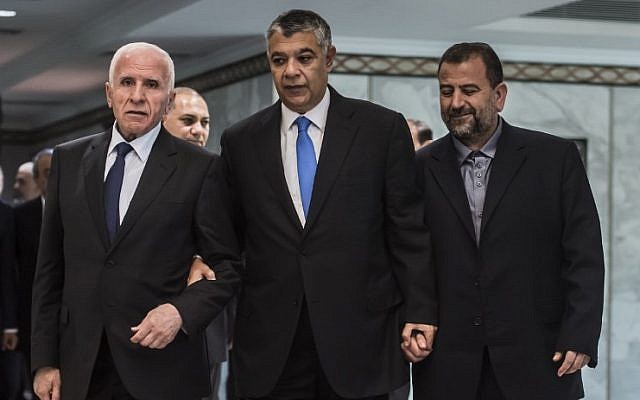Newly signed agreement in Cairo rests on PA resuming control of Gaza but sticking points include Hamas recognition of Israel, fate of armed wing, ongoing terrorism

The two major Palestinian factions reached a unity agreement Thursday after Egyptian mediation.
Islamist group Hamas, listed as a terror group by Israel, the US and the EU, and the secular Fatah party have ruled over separate territories since Hamas seized power from Fatah in Gaza in a near civil war in 2007.
Here are key points of the agreement and what remains unaddressed:
– The Fatah-dominated Palestinian Authority, which is based in the West Bank, will resume full administrative control of Gaza by December 1 at the latest.
– All the major Palestinian factions, including Fatah and Hamas, will meet in Cairo on November 21 for discussions about forming a unity government.
– The border crossings from Gaza with Israel and Egypt will be handed back to the Palestinian Authority in the coming weeks, with a November 1 deadline, according to the Fatah negotiator Azzam al-Ahmed. The crossing with Egypt may require more time for the handover.
– Palestinian Authority President Mahmoud Abbas will visit Gaza for the first time in a decade in the coming weeks, according to an official from his party.
– The issue of tens of thousands of civil servants employed by Hamas will be solved by February 2018, according to Hamas’s Al-Aqsa television.
– Punitive measures taken by the PA against Gaza, including reductions in energy payments for the strip, are expected to be relieved.
Still to be resolved
– The future of Hamas’s 25,000-strong military wing, the Izz ad-Din al-Qassam Brigades, was not mentioned in any of the public statements or documents. Nor was the fate of the weaponry in Hamas hands. Hamas has fought three wars against Israel since 2008, dug terror tunnels under the Israeli border and fired thousands of rockets into Israel. It continues to dig tunnels and manufacture rockets. Abbas has hitherto demanded that Hamas disarm as a precondition for any deal, something that Hamas has refused to consider.
Israel has said it will reject any agreement in which Hamas does not disarm, as has the United States. Israel has also demanded Hamas, end all terror activity against Israel, and release the remains of two IDF soldiers killed in the 2014 summer war between Israel and Hamas.
– Recognition of Israel was also not mentioned. The Abbas-led Palestine Liberation Organization has recognized Israel, while Hamas has not; rather, it is vowed to Israel’s destruction.
Hamas is classified as a terrorist group by the United States and European Union, and Western diplomats say they could not accept any government of which Hamas is a part unless it recognizes Israel, renounces terrorism and accepts previous Israeli-Palestinian agreements.
As reported by The Times of Israel
